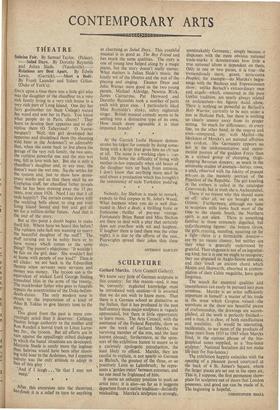THEATRE
ONCE upon a time there was a little girl who was the daughter of the chauffeur to, a very rich family living in a very rich house in a very rich part of Long Island. One day her fairy godmother (or State College) waved her wand and sent her to Paris. You know what people do in Paris, chums? They learn to develop their appetites and to dis- cipline them (0 Talleyrand! 0 Vauve- nargues!) Well, this girl developed her appetites and disciplined them (by shooting wild boar in the Ardennes?) so admirably that, when she came back to live above the garage of the very rich family, the two sons, the ruthless powerful one and the nice wet one, fell in love with her. But she is only a chauffeur's daughter and, in any case, she doesn't want the wet one. SIA she settles for the tycoon and, just to show how demo- cracy works and so that there shall be no Cophetua stuff, her chauffeur father reveals that he has been stowing away the 15 per cents. ever since 1926. Need I say that it all ends happily? The curtain comes down with the wedding bells about to ring out over Long Island Sound and boy and girl all set for a million-dollar future. And that is the end of the story.
But at this point a doubt begins to make itself felt. Where have we heard this before? The ruthless rake-hell son wanting to marry the beautiful daughter of the staff? The Staff turning out to be nobly born or to have money which comes to the same thing? The parent's objections: 'It wouldn't be fair on the girl, dear. She wouldn't feel at home with people of our kind?' Then it all clicks: we are back in the Edwardian theatre when servants were servants and Money was money. The tycoon son is the equivalent of wicked Lord George finding connubial bliss in the arms of the tweeny. The stockbroker father who goes to funerals repeats the eccentricities of the Duke-before- death-duties. The only modern note is struck by the importation of a kind of Alice B. Toklas to give literary tone to the Party.
This ghost from the past is more con- vincingly acted than it deserves: Cathleen Nesbitt brings authority to the mother and
Ron Randell a horrid truth to Linus Larra- ' bee Jnr., the tycoon. But all efforts are in vain against the appallingly stilted dialogue
in which the banal situations are developed. Marjorie Steele is surely more the ingenue than Sabrina would have been after shoot- ing wild boar in the Ardennes, but I suppose nalvety was the only attitude to adopt in face of this play : 'And if I laugh ... 'tis that I may not weep.'
• • • After this excursion into the theatrical bas fonds it is a relief to turn to anything as charming as Salad Days. This youthful musical is as good as The Boy Friend and has much the same qualities. The story is one of young love helped along by a magic piano, but the story doesn't really matter. What matters is Julian Slade's music, the kindly wit of the libretto and the zest of the playing and singing. Eleanor Drew and John Warner were good as the two young people, Michael Aldridge, Newton Blick, James Cairncross, Pat Heywood and Dorothy Reynolds took a number of parts each with great ease. I particularly liked Miss Reynolds's slinky, sultry nightclub singer. British musical comedy seems to be settling into a distinctive type of its own. How much more agreeable it is than imported brands!
•
At the Garrick Leslie Henson demon- strates his talent for comedy by doing some- thing with a script that gives him no chrnce at all. The scene is a working class it. use- hold, the theme the difficulty. of living with mother-in-law especially when old beaux of the daughter turn up back from amnesia. I don't know that anything more need be said about a production which has (roughly) the consistency of stale Yorkshire pudding.
•
Nobody, Joy Shelton is made to remark, expects to find corpses in St. John's Wood. What happens when you do is well illus- trated in Meet a Body, a thrilling frolic or frolicsome thriller of pre-war vintage. Fortunately Brian Reece and Miss Shelton are there to deal with a play that certainly does not overflow with wit and laughter.
If laughter there is (and there was the other night), it is due to the efforts of the cast. Playwrights spread their jokes thin these days.
ANTHONY HARTLEY


































 Previous page
Previous page